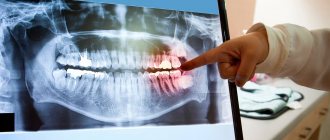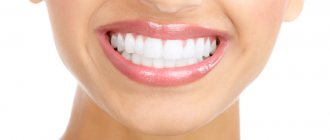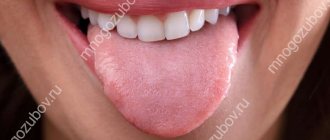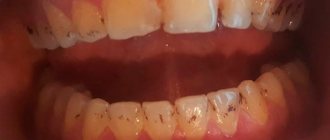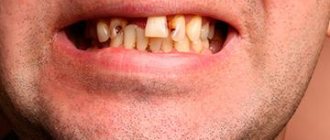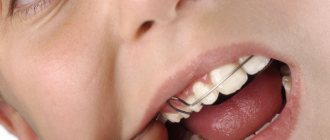Publication date: 01/25/2021
Every person's teeth are designed to last for many years. They have several levels of protection:
- Enamel is a highly durable mineralized tissue that protects the surface of the tooth.
- Dentin is a less hard tissue, but also strong. The main task of dentin is to protect the pulp - the inner tissue. It is the nerve endings in the pulp that signal us about the problem. If the surface layers are broken, we experience pain.
- Cement - covers the roots, protecting them from adverse influences
Overcoming these layers of defense is not easy, but it is possible. And then the teeth rot.
Causes of rotting
In the first place is fear. It is the irrational fear of the dentist, which is difficult to control, that makes us put off visiting the doctor. Often to the point where it is no longer possible to save the tooth. No matter what facts they give us, no matter how much we persuade ourselves, phobias do not lend themselves to rational arguments.
But this is far from the only reason.
General diseases
Our body is a single system. Discord in one place leads to problems in another. Thus, diseases of the gastrointestinal tract cause dental problems.
Infections, fungal diseases, even hormonal imbalances often lead to inflammatory processes in the mouth.
Ecological problems
In regions where drinking water is of poor quality, dental problems are 3-4 times more common. The same picture is observed where there are large industrial enterprises. Increased amounts of toxic microelements in the environment harm overall health and negatively affect teeth.
Diet
There are foods that provoke the growth of bacteria in the oral cavity, which means they contribute to tooth decay. Yes, that same sugar, but not only that. Acids formed during the fermentation of carbohydrates are the main enemies of enamel.
Lifestyle
Addictions of any kind are not good for dental health. Cigarettes, drugs, alcohol are a direct path to problems.
This also includes restrictive diets. Vegetarians, vegans, and Keto fans need to carefully ensure that the body receives all trace elements and vitamins.
Oral diseases
Inflammatory processes in the mouth are a haven for bacteria. Therefore, it is important to regularly carry out sanitation and ultrasonic cleaning of teeth. Periodontal disease, periodontitis, stomatitis, gingevitis, cheilitis require special treatment, which is better not to delay.
Oral hygiene
This is perhaps the easiest way to destroy teeth. All that’s left to do is brush and floss twice a day. 90% of the population does this, but not as carefully as we would like. There are special teeth cleaning schemes. They involve treating surfaces from all sides and for a certain time. Unfortunately, now
90% are those who brush their teeth for less than 1 minute.
Genetic predisposition
Alas, often all preventive measures are not able to help keep teeth safe and sound. Healthy, strong teeth, just like bad ones, are inherited.
Features of caries on figure eight
The cause of this disease is the accumulation of bacterial plaque and poor hygiene. “Eights” erupt late, on average after 18 - 20 years, and sometimes remain partially unerupted (impacted). At the same time, wisdom teeth are located far in the oral cavity, and it is almost impossible to clean them properly. If part of the crown is located under the gum, a so-called gum hood is formed, where food particles easily fall, and the tooth is destroyed even faster. These factors are the main reasons for the appearance of caries on the figure eight.
Online consultation with a doctor
If you are concerned about the condition of your teeth and the symptoms described in this article: putrid odor, pain when biting, sensitivity of the enamel to cold, hot, sour, sweet, dark holes on the tooth, then it is best to undergo an examination and consultation with a dentist. Because these may be symptoms of deep caries, cysts, and other diseases. Bacteria or infection, entering the blood or lymph, affect healthy tissues, causing complications and illnesses. Which, if neglected, will lead to more expensive treatment:
- depulpation;
- dental restoration;
- deletion;
- dental implantation;
- prosthetics;
- treatment of adentia.
How does the removal work?
If there are indications for the removal of wisdom teeth with caries, the procedure is performed exclusively by a dental surgeon. Depending on the condition of the tooth and the characteristics of its development, simple or complex extraction can be performed.
Simple removal involves the usual manipulation of tooth extraction using forceps. But such a procedure is only possible if the only pathology is caries.
Most often, third molars require complex removal, which involves dental surgery and surgery. Complex removal is necessary for pathology of the root system, destruction of more than 50% of the tooth surface, dystopia or retention. During the procedure, the dentist may resort to cutting soft tissue, breaking the tooth and removing it in parts and other manipulations.
After removal of wisdom teeth with caries, an x-ray diagnosis is required to exclude remnants of parts of the tooth or root. After this, stitches are applied.
Stages of decay development
There is no acute form of caries, so small changes are difficult to notice, they accumulate - and now a person cannot smile, only stumps of teeth remain. Therefore, it is important to undergo preventive examinations regularly. The dentist can identify the problem at the initial stage and can easily fix it.
- Rotting begins at the spot stage. The color of part of the surface changes. Enamel demineralization begins. At this stage, treatment is quick and easy.
- The superficial process of demineralization is increasing, but the pain syndrome has not yet manifested itself. The tooth can react to sweet, sour, cold, hot.
- Middle stage The lesion reaches the enamel-dentin junction. Painful sensations occur periodically. Large areas are affected.
- Deep damage The decay process affects the dentin surrounding the pulp. If this process is left unattended, pulpitis will develop. And this is far from the only problem.
How to protect yourself from complications of dental diseases
To avoid any complications, it is best to prevent the diseases themselves. There is nothing complicated here:
- 1. Brushing your teeth twice daily. In this case, it is necessary to change your toothbrush in a timely manner (usually once every three months) and carefully choose toothpaste, taking into account the doctor’s recommendations;
- 2. Regular visits to the dentist. If you go to the doctor every six months, you will be able to either completely avoid caries, or cure it at the earliest stage - quickly and without any discomfort;
- 3. If a tooth has been removed or deformed (part of it has broken off, a filling has fallen out), you also need the help of a doctor. Such violations spoil the bite, and the load on neighboring teeth will increase. They will become more vulnerable to adverse effects.
Of course, to avoid complications, you should immediately consult a specialist as soon as a pathological process or painful sensations are noticed.
Complications
Bad teeth are a direct path to a heart attack
. When the tooth's protection is destroyed, bacteria enter directly into the bloodstream. There they can provoke the development of blood clots, inflammation of blood vessels, and this leads to the development of coronary artery disease, which is not far from a heart attack.
Gastrointestinal problems
Rotten teeth make it difficult to chew food well. Not only do poorly chewed pieces irritate the mucous membrane, pathogenic flora from damaged teeth enters the stomach and intestines, where they can multiply uncontrollably, causing diseases such as gastritis, pancreatitis, stomach ulcers and duodenal ulcers. Competent gastroenterologists always advise visiting a dentist.
Diseases of the throat and nose
A constant source of infection in the mouth means that any malfunction in the body will cause a relapse of diseases such as sore throat and sinusitis. Purulent infections are dangerous because they can lead to blood poisoning. And such diseases are difficult, often causing complications. Inflammation of the tonsils often causes rheumatism and heart problems. Those who struggle with chronic sinusitis need to especially carefully monitor the condition of the oral cavity. Chronic manifestations will not go away if there are rotten teeth in the mouth.
And the head too
An advanced inflammatory process can spread to the trigeminal nerve. It is closely connected with the brain, and this is a serious matter. Chronic migraines, memory problems, even Alzheimer's disease are associated with oral health. Although there is no direct evidence that Alzheimer's is caused by the same bacteria that cause inflammation in the mouth, it is better to be on the safe side.
Abscesses and cellulitis are also the result of bacterial inflammation.
Wisdom tooth caries - treat or remove?
It is important to remember that the carious process cannot be left to chance even at the initial stage: the infection spreads quickly, and even healthy organs of the oral cavity can soon be affected. It's time to answer the question that torments many: if wisdom tooth caries is detected, what to do - therapy or removal?
Removal of a wisdom tooth with caries is indicated
- A wisdom tooth is a rudiment that is practically not used in the chewing process, and there is little benefit from it.
- Eights are located far away, access to them is limited, which makes it very difficult to provide quality treatment. This increases the likelihood of re-infection.
- The therapy is tiring for the patient because he has to sit with his mouth wide open throughout the entire procedure. This is especially true for the treatment of caries of the upper wisdom tooth.
As a rule, removal is indicated in cases where the tooth is dystopic and/or impacted, constantly injures the cheeks and tongue, and causes inflammatory processes due to difficult eruption. Whether to remove a wisdom tooth with caries, if it grows normally and does not cause any problems, should be decided individually together with a specialist.
What to do when the process of tooth decay begins
Modern dentistry is not about pain at all. This is about caring for the patient and the desire to preserve his teeth.
Dentists' advice is simple, but how many people follow it?
How to prevent teeth from rotting:
- Lead a healthy lifestyle
- Takes good care of your teeth
- Carry out hygiene procedures regularly
- Monitor your general health
Plaque on teeth is the beginning of the decay process. Regular cleaning of tartar is one way to keep your teeth healthy.
Symptoms and diagnosis
The main symptom indicating activation of third molar growth is pain that occurs when chewing. In the case of the formation of a cyst or “hood,” inflammation develops, which, in addition to pain, can be accompanied by an increase in body temperature, enlargement and soreness of the submandibular lymph nodes, and a headache due to the development of the inflammatory process.
A sign that wisdom teeth are growing abnormally is:
- acute pain in the temporomandibular joint;
- numbness of the jaw and aching pain. This may indicate improper growth inside the bone and possible trauma to the jaw nerve;
- inflammation and enlargement of lymph nodes. As a rule, such a sign indicates that an infectious process has begun;
- redness, swelling of the gums and pain when pressing on it;
- displacement of teeth in a row.
If you have such symptoms, you should immediately visit your dentist for diagnostic measures. Only a specialist can confirm or deny the presence of problems associated with the growth of the third molar.
Diagnosis of an impacted tooth, completely or partially hidden under the gum tissue, is carried out in several ways:
- Palpation and probing;
- Sight radiography - to determine the direction of growth and the number of roots;
- Orthopantomography;
- Computed tomography.
The diagnostic method is determined directly by the doctor; sometimes an examination in the dental chair is sufficient, and sometimes an x-ray is necessary to identify existing problems and predict the risk of their development in the future.
Treatment
Sick teeth need to be treated, the sooner the better. The dentist’s task is to save the tooth, but if measures are not taken in time, it will have to be removed to avoid serious consequences.
Methods:
- Remineralization Applications of calcium and fluoride preparations and electrophoresis help restore enamel at the initial stage.
- Filling the cavity The affected tissues are removed, their place is filled with filling material.
- Partial prosthetics A crown is placed on the tooth, which protects it from mechanical and biological influences. The crown is placed on a previously depulped, dead tooth.
- Removal If the pulp is affected and the inflammatory process threatens to develop into an abscess, the tooth is pulled out. You should not resist the removal of rotten teeth - they do nothing but harm.
It is easier to prevent any process than to take a long time to eliminate the consequences. By following simple preventive measures and regularly visiting the doctor, you can avoid tooth decay and maintain your smile and self-confidence for many years.
Deep caries of wisdom tooth
If the development of the carious process is not stopped in time, the infection will gradually penetrate deeper and eventually reach the pulp. Inflammation in the pulp tissue is called pulpitis and is accompanied by aching pain that is difficult to ignore. It is not easy to treat deep caries of wisdom teeth, since it is necessary to fill the root canals, and the roots of figure eights are usually curved. Untreated pulpitis can develop into more serious diseases - wisdom tooth cyst or periodontitis, which are much more difficult to combat.
Why do children's teeth rot?
In children, the composition of saliva is not the same as in adults. Its antibacterial properties are low; in a warm, humid environment, microbes multiply quickly. The disease is not only common, it progresses rapidly. Caries spreads in width and depth. Single events are rare; usually several teeth are affected at once. For children, timely identification and treatment of problem teeth is of particular importance. Rotten teeth can cause:
- pulpitis and periodontitis;
- malocclusion;
- loss of milk and permanent teeth;
- inflammation of the maxillofacial apparatus.
Bad teeth affect the social adaptation of children and lead to psychological problems.
Prevention includes hygiene procedures, limiting sweets, a balanced diet and regular dental examinations.
What to do
Of course, you shouldn’t sit and wait for the pain and discomfort in the area of a tooth overgrown with gums to go away on its own. It is best to immediately contact a specialized dental clinic for medical advice. Only he will be able to conduct a comprehensive examination of the oral cavity, prescribe the necessary tests, conduct an X-ray examination and prescribe the correct treatment.
As a rule, a broken tooth that is overgrown with soft tissue is carefully removed. This requires making an incision in the gum. If the tooth is healthy, then after opening the hole the doctor can install an artificial root and prosthesis into it.
If it is not possible to save the tooth, then a procedure is performed to extract its root system. To do this, the specialist uses a special tool called an elevator, with which he cuts the top of the unit and gradually brings it to the surface. Such manipulations are carried out under local anesthesia and do not take much time. After extraction of a diseased tooth, a medicinal drug can be applied to the wound, which promotes faster healing. The stitches are removed after a few weeks.
Indications for removal of eighth teeth
wisdom teeth
begin to grow much later than other permanent teeth, as a result of which they often do not have enough space in the jaw. Lack of space provokes all sorts of curvature of roots and crowns. Doctors advise removing such molars. Here is another list of problems that may require extraction:
- A pronounced tilt of the figure eight towards the seventh tooth or cheek.
- Hypercementosis (excessive deposition of secondary cement, in which the tooth root thickens and becomes deformed).
- Incomplete eruption of the tooth or its location in the bone (retention).
- Destruction of the crown or roots of the figure eight, as well as neighboring teeth (after injury or caries).
- Granuloma (granulation in the form of cystic sacs with pus located in the periodontium).
- Rotation of the tooth around its axis or horizontal position (dystopia).
- Deformation of the roots (they can bend in every possible way, even twist into a spiral or form an angle of 90°).
- The close location of the roots of the upper eights to the nasal maxillary sinuses.
- In the presence of pericoronitis (an acute inflammatory process in the area of the eruption of the figure eight, accompanied by pain and an increase in ESR in blood tests).
An incorrectly growing 8th tooth can compress the facial nerves and provoke neuritis, which is expressed by sharp pain radiating to the ears, neck, temple, and can lead to facial paralysis.
Teeth and pregnancy
We found out why children's teeth rot. There is another group of people particularly at risk of tooth decay. These are pregnant women. Some scientists classify pregnancy as an immunodeficiency state - the body's resistance to pathogens decreases to such an extent. It’s no wonder that during pregnancy, general diseases worsen and dental problems begin. The increased content of hormones in the body reduces the barrier ability of the epithelium, microorganisms more easily penetrate the gums and begin to multiply.
Help protect your teeth:
- rational and balanced diet;
- multivitamin complexes;
- professional oral hygiene;
- herbal baths;
- applications with calcium and phosphates.
Prevention after surgery
The rehabilitation period after removal of an impacted wisdom tooth lasts longer than after a normal one. Healing of the gum socket can take up to 2-3 weeks. During this period, it is important to follow the doctor's recommendations to prevent complications. It is necessary to carefully but delicately carry out hygienic care of the oral cavity. For the first days after the intervention, take painkillers and follow a gentle diet. Too hard, burning foods can damage the gums and cause tissue inflammation.
Dentists also recommend rinsing the mouth after each meal using antiseptic solutions, herbal decoctions, or just water. During the week, you must avoid physical activity, visiting the gym, baths, saunas. If any complications occur, you should not self-medicate; you must immediately seek help from a doctor.
If it hurts, what should you do?
In case of acute pain in the area of the impacted tooth or after extraction, you can take an anesthetic. For this purpose, non-steroidal anti-inflammatory drugs are best suited - Nimessil, Ibuprofen, Paracetamol, Ketanov. At home, you can also carry out hygienic cleaning and rinsing the mouth with antiseptics. For a professional examination and treatment, you must visit a dentist.
